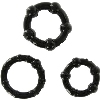Are circumcised and uncircumcised penises really that different? What are the positive and negative effects of circumcision? This is a very common procedure, but how does it affect circumcised people? All these questions are very common and we are here to clarify everything you want to know about circumcision.
Circumcision: An Overview of the Procedure
Circumcision is a surgical procedure in which the skin covering the tip of the penis is removed. This small piece of skin is called the foreskin. The foreskin is a continuation of the skin that covers the rest of the penis. In most cases, circumcision is performed during the first month of life. It is much more uncommon for circumcision to be performed on adults.
Circumcision is routinely performed in certain religions, particularly the Jewish religion. For those who practice the Jewish faith, circumcision is usually performed on the eighth day of life. Circumcision is not required in Islam, but it is encouraged. Islam does not dictate a specific age when circumcision must be performed.
Health: certain medical conditions, such as phimosis (when the foreskin is too tight and cannot be pulled over the head of the penis), may require circumcision.
Hygiene: Some parents believe that circumcision will make it easier for their children to maintain proper genital hygiene throughout their lives.
Personal Preference: Parents can make this decision because the procedure has traditionally been performed in their families, regardless of religion.
When circumcision is performed for religious reasons, it is sometimes performed as part of a ritual. Medical professionals recommend that circumcision be performed in a medical, sterile environment by a qualified physician.
Circumcision is a short procedure that is usually done using local anesthesia or a numbing cream, although general anesthesia can be used in older children. Different methods can be used to perform a circumcision. Afterwards, instructions are given to take care of the penis until it is fully healed. There are certain risks associated with circumcision, such as:
- Excessive or inappropriate removal of the foreskin
- Bleeding or infection from the surgical site
- scar on the penis
- Skin adhesions on the tip of the penis
- Meatitis, or inflammation of the opening of the urethra
- Meatal stenosis, or a narrowing of the opening of the urethra
- Permanent reduction of sensation in the head of the penis, especially during sex.
Most of the risks associated with circumcision are minor and can be easily managed. Serious complications can occur, but are uncommon. Circumcision is not recommended in patients with clotting disorders, as they may experience heavy bleeding as a result of the procedure. These risks should be discussed with a doctor.
When an uncircumcised penis is flaccid, the foreskin covers the head (glans) of the penis, giving it a “hooded” appearance. A circumcised penis, on the other hand, will not be covered by any skin. Circumcised and uncircumcised penises look very similar when erect. When an uncircumcised man gets an erection, the foreskin naturally retracts to expose the glans. The skin on a circumcised penis may feel harder than on an uncircumcised penis.
Circumcised and uncircumcised penis: hygiene
The foreskin of an uncircumcised penis can act as a reservoir for bacteria, dead skin cells and sebum. These elements can create a smelly substance called smegma. Smegma can lead to penile inflammation or balanitis, which can eventually cause phimosis. However, good genital hygiene can prevent these problems. Adolescents and uncircumcised adults must retract the foreskin to properly clean the penis.
The age at which the foreskin can be retracted varies from person to person. The foreskin normally cannot be retracted in children younger than 5 years, but it must be fully retractable by puberty. Circumcision makes it easier to clean the penis, it simply needs to be washed regularly. Circumcision is linked to a much lower risk of developing penile cancer, which has been linked to smegma and phimosis. However, this is a rare condition and good hygiene can also help lower this risk.
Circumcised and uncircumcised: sex differences
There is much debate about whether circumcised and uncircumcised people experience sex differently. Scientific studies have produced conflicting results. Some studies have found that circumcised men experience lower levels of sexual pleasure. However, these findings have been rebuked by other studies that have found contradictory evidence.
Health professionals generally agree that although the foreskin is a very sensitive area, circumcised people can achieve the same levels of pleasure and sexual satisfaction as uncircumcised people. Circumcision has not been conclusively shown to have adverse effects on sexual function. Circumcision can affect the natural ability to lubricate the penis during intercourse and masturbation. However, this can be offset by using extra lubrication, which can improve sex for both partners.
Circumcision: does it affect fertility?
Circumcision does not have a direct effect on a man's fertility. Not being circumcised increases your risk of developing phimosis or infections like balanitis and STDs. These conditions can affect male fertility, but these risks can also be avoided through good hygiene. There are other factors that can have a much more significant effect on male fertility, including diet, lifestyle, hormone imbalances, certain medications, sperm count and chronic health conditions.
Circumcised and uncircumcised: risks of infection
Circumcision reduces the risk of contracting HIV from an HIV positive partner. The foreskin contains Langerhans cells, which are more likely to bind to the HIV virus than other types of cells. Circumcised men also have a lower risk of contracting genital herpes and HPV.
Circumcised babies have a lower risk of developing a urinary tract infection or UTI during their first year of life. But even in uncircumcised babies, this risk is only about one percent.















